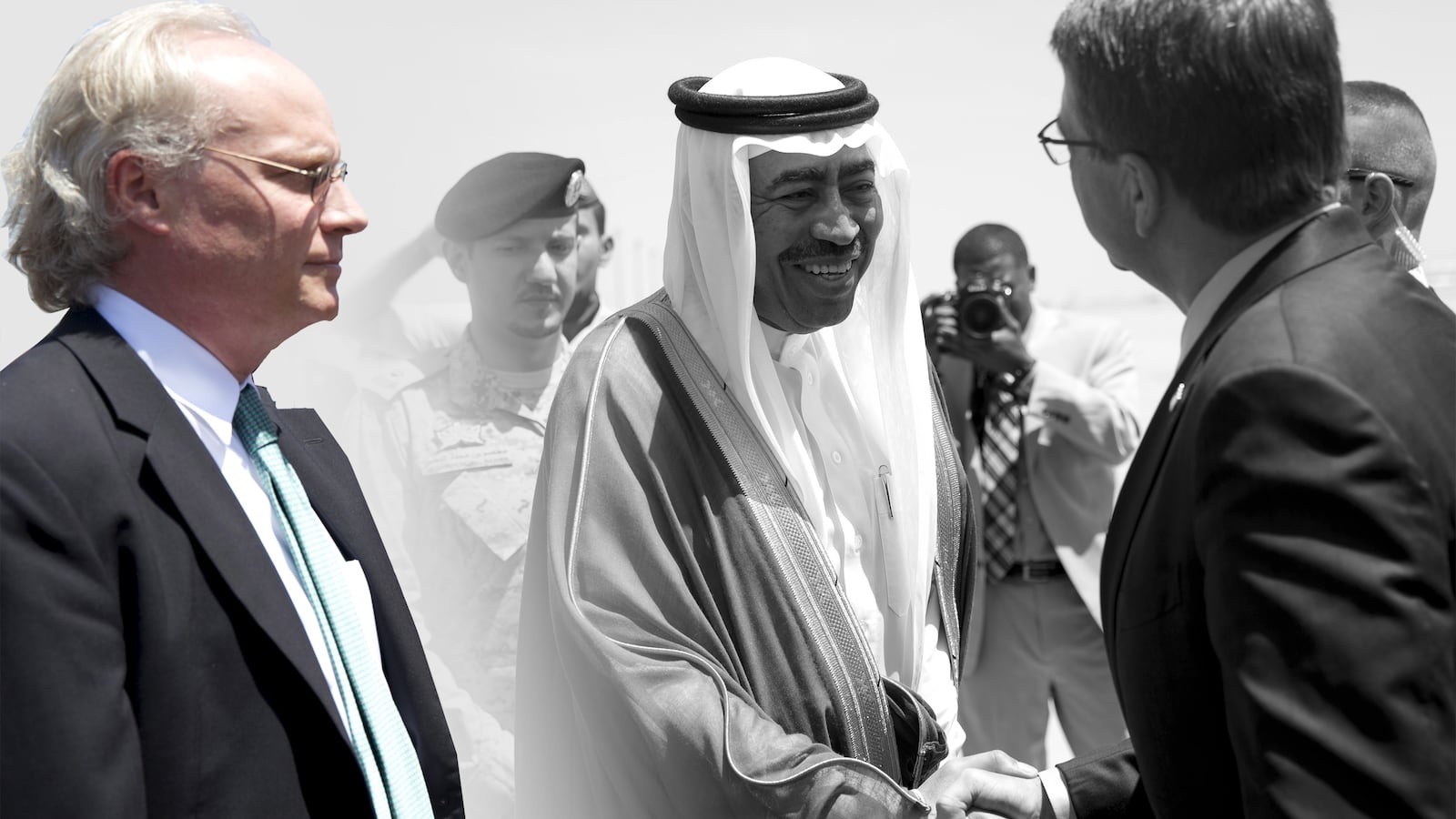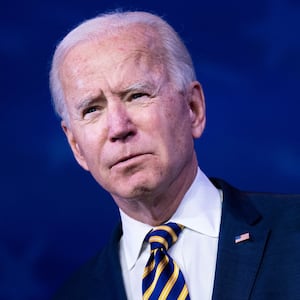In mid-March, CNN broadcast harrowing images of the persistent human catastrophe in war-torn Yemen. Hospital beds filled with starving children, their labored breathing accentuating the outlines of bones visible through their flesh, as trucks with desperately-needed aid stalled without fuel. It was the consequence of Saudi Arabia’s blockade of the Red Sea port of Hodeidah, part of a net of air and sea restrictions that the United Nations says kills more people than the U.S.-supplied bombs dropped by Saudi warplanes.
President Joe Biden took office pledging not only to end U.S. support to the Yemen war, but to end Saudi Arabia’s war outright. One of his most lauded steps, which Biden announced in his first foreign policy address, was to make a longtime diplomat named Tim Lenderking a special envoy for pushing a diplomatic settlement to the conflict. Yet when CNN asked Lenderking about the blockade, Lenderking downplayed the economic chokehold as something to be negotiated away, not lifted—and treated the Saudis, the architects of that U.S.-aided chokehold, as serious about peace.
“They are ready to sit down to negotiate an end to the conflict with all relevant parties, including Ansar Allah, sometimes referred to as the Houthis, during which access to ports and other issues could be addressed and resolved quickly,” Lenderking said.
CNN’s astonished reporter, Nima Elbagir, told anchor Jake Tapper, “He says that those boats are currently off the port of Hodeidah, and, Jake, that's just not true. He also says that food continues to flow through Hodeidah unimpeded and also, that is just not true. You saw those food trucks along the side of that road.”
It was a curious position for Lenderking to take. A month earlier, he had been part of a meeting with the United Nations’ Yemen envoy, Martin Griffiths, with senior Saudi officials in Riyadh. According to Griffiths’ account of the Feb. 11 meeting, they discussed “the acute fuel shortages in Ansar Allah-controlled areas and the need for immediate actions to avoid further exacerbating the humanitarian and economic situation.” Days after the CNN broadcast, Griffiths reported to the U.N., “fuel imports have not been permitted to enter Hodeidah since January.”
Lenderking’s allies describe him as a consummate diplomat who articulates policy that higher-ups craft. His diplomacy is credited with getting the Saudis to allow four fuel ships to dock at Hodeidah recently. But his comments to CNN were the latest in a pattern of statements from the U.S. official that articulate the position of the Saudis—whom the U.S. is meant to be pressuring to end the war that Crown Prince Mohammed bin Salman started. More broadly, since Biden took office, State Department comments on Yemen tend to aim their criticism at the Houthis more than the Saudis. Antiwar critics are starting to consider Lenderking a symptom of a broader problem with how Biden is approaching Yemen.
A Democratic congressional aide who focuses on Mideast policy and who requested anonymity to speak candidly called it “baffling that Lenderking, who both publicly celebrated U.S. support for the Saudi war and opposed the attempt by Congress to reassert its constitutional authorities, would be put in charge of negotiating a peaceful settlement for Yemen.”
A letter to Biden last week signed by the actors Mark Ruffalo, Amy Schumer, and 74 progressive organizations singled out Lenderking for “declin[ing] to adequately respond” to the CNN account of the blockade. Combined with another letter from 70 Democratic legislators—one that also called out Lenderking—the end of antiwar groups’ patience with Biden over Yemen is nigh. And on Tuesday, 12 legislators on the House foreign affairs committee appealed to Secretary of State Antony Blinken to press the Saudis to stop their “interference, delay, and outright blocking” of goods attempting to enter Yemen’s ports.
“I have no problem with Lenderking calling out Houthi human rights violations, obviously that’s part of his job, but he should emphasize that the first thing that needs to happen is the lifting of the blockade, and the key point is it shouldn’t be connected to the broader negotiation to end the war,” said Rep. Ro Khanna (D-CA), one of the leading antiwar voices in Congress.
“The question is,” Khanna continued, “are they taking bold enough action? The times call for really bold measures, not just an incremental approach that risks thousands dying.”
Lenderking is currently traveling on his fourth foreign engagement since taking office. The State Department, which in an official statement characterized the port of Hodeidah as “open,” did not make the special envoy available for an interview. But in response to queries for this story, Lenderking provided the following statement: “The United States understands the urgent need for fuel to get into Hodeidah port. This is a constant priority in our conversations with the Republic of Yemen Government and Saudi Arabia.”
While it has only been two months since Lenderking’s appointment, activists and congressional staffers eager to end the conflict say that his posture reflects a diplomatic approach by the Biden administration and the U.N. likely to prolong a war that has already killed nearly a quarter million people.
That’s because, as Lenderking’s comment to CNN formulated it, he and Griffith seek a comprehensive political settlement rather than first securing an end to the blockade. Lenderking called it “a dual-track approach to building international support to achieve a lasting political solution while bringing humanitarian relief to the Yemeni people.” The administration and the United Nations are pushing for a ceasefire between the Saudis and the Houthis that can start a peace process.
Yemen observers in and outside the government say that sounds appealing on its face, but functionally freezes a humanitarian crisis in place. The Saudis are backing a plan that Washington and the U.N. appear to have coordinated that would trade a ceasefire for a blockade lift. But the Houthis, which control territory where an estimated 80 percent of the Yemeni population live, appear disinterested in negotiating, thanks to their recent battlefield advances, particularly in Marib—and abiding distrust in Americans who have supported their adversaries. “When we say death to America, they effectively kill us with their bombs, rockets and blockades,” a Houthi leader told CNN.
All the while, the humanitarian crisis is intensifying. Griffiths last month warned the U.N., “the war is back in full force.” An impassioned David Beasley, the former South Carolina GOP governor and executive director of the World Food Programme, reported on Mar. 11 that without “urgent intervention” a staggering 400,000 Yemeni children will die in 2021. Beasley took aim specifically at the Saudi blockade, saying “that blockade must be lifted, as a humanitarian act. Otherwise, millions more will spiral into crisis.” Beasley, in a separate interview with the AP, also pointedly said that he had “turned a corner with the Houthis” in terms of cooperation for humanitarian access.
Such horrific conditions are fraying the patience of those already disappointed by Biden maintaining ties with Saudi war architect Mohammed bin Salman. While Biden said he was ending material U.S. support for the war, he’s continuing certain arms sales to Riyadh—and conspicuously not using the U.S. contributions to the Saudi war machine as leverage. Even those American observers who have been traditionally sympathetic to the Saudis consider that a mistake.
“We could end the war overnight by saying we’re not going to provide any logistics and spare parts for the Saudi air force,” said Bruce Reidel, a former CIA official at the Brookings Institution. “What the Biden administration should do is demand an immediate, unequivocal and complete lifting of the blockade to allow food, medicine and whatever else to go into Hodeidah and other Yemeni ports.”
Lenderking has seen the war up close since its inception. A career diplomat, he has extensive experience with Saudi Arabia—leading some to worry that his positions disproportionately favor the royals.
When bin Salman began the war in 2015, Lenderking was the second-in-command of the U.S. embassy in Riyadh. From there he transitioned to becoming the deputy assistant secretary of state for Arabian Gulf affairs, making him a key figure at Foggy Bottom for the U.S.-Saudi relationship. Speaking at a May 2017 conference at the Arab Gulf States Institute in Washington, Lenderking commented, “We were wary of the Yemen conflict. We still are, in some cases, but we’ve really pivoted.” With Donald Trump in office, Lenderking continued, the U.S. enjoyed “a more robust relationship with Saudi Arabia.”
That August, Lenderking accompanied Jared Kushner and then-NSC official Dina Powell to Riyadh to meet with bin Salman. Asked in December 2017 if the Saudis were to blame for the humanitarian crisis, Lenderking equivocated that there was “a lot of blame to go around.” The following month, when the Saudis briefly lifted the blockade and U.S. aid arrived, Lenderking gushed, “the Saudi-led coalition was also very instrumental in helping us with the logistics here.”
Lenderking’s appointment has thus far been received as a welcome signal that ending the war is top-of-mind for Biden. He’s extensively discussed Yemen with Griffiths, the Saudis and their Yemeni government-in-exile clients. The State Department will not answer whether he has met with the Houthis or their emissaries, although several people interviewed for this story assume he has. “Tim is an accomplished career diplomat and we trust that he and the Biden administration are prioritizing a diplomatic solution in Yemen,” said a congressional aide who requested anonymity.
Others on Capitol Hill remember Lenderking differently. As the antiwar coalition persuaded Congress to revoke authority for aiding the Yemen war, Lenderking was part of a Trump administration briefing against the measure. In the final week of the Trump administration, Lenderking informed Congress of a now-revoked decision to declare the Houthis a terrorist movement, prompting a staffer to remark, “you need to stop fucking lying to Congress.”
In a statement for this piece, a State Department spokesperson said the port of Hodeidah “remains open,” which is the Saudis’ official position.
<p>“The United States does not support restrictions on the importation of essential goods into Yemen, including through Hodeidah port, by any party. Hodeidah port remains open and commercial imports of food and other commodities are moving through the port at normal rates, along with goods imported for humanitarian assistance purposes. We are concerned by the ongoing slowdown of commercial fuel imports and we will continue to engage on this issueBut the root cause of Yemen’s food security crisis is protracted conflict and its widespread consequences, particularly erosion of basic services and the economy. We cannot hope to reverse that crisis until fighting eases and parties support a political transition rather than military gains.”</p>
Khanna called it “State Department gobbledy-gook for saying there’s a blockade where fuel isn’t getting in. All of what they’re saying is technically true—yes, if we could wave a magic wand and end the fighting in Yemen—is that the root cause? Obviously it’s the root cause, but the blockade is an imminent cause of the famine.”
Peter Salisbury, the senior Yemen analyst at the International Crisis Group, said that food imports have been allowed into Yemen at a faster pace than last year, but “this is more complicated than a blockade that stops anything getting into Houthi-controlled areas. It’s Saudi and Yemeni government control over trade flows into Hodeidah that allows goods to enter, but lets them dictate the timing and the pace. It’s a contributing factor to the hunger crisis, but not the only factor. And it’s part of the bigger political and military power struggle over sovereignty. The truth is this has been an economic war waged by all sides as much as it has been a military one, and in both cases it’s ordinary people who have paid the highest price.”
Gerald Feierstein, who was U.S. ambassador to Yemen at the dawn of the war, has known Lenderking for ages and considers him “absolutely a professional.” Feierstein considers it overly simplistic to attribute blame for the war entirely to Riyadh, including for the starvation conditions in Yemen. At the dawn of the war, “the Saudis had legitimate security concerns, leaving aside everything that happened subsequently. That’s where I’m coming from and where I believe Tim is coming from as well,” Feierstein said.
Criticisms of Lenderking aside, antiwar Yemen observers say there’s a fundamental problem with Biden’s initiative to end the war. It’s not his alone, but the United Nations’ as well. Their efforts are predicated on a Security Council resolution, 2216, that holds the Houthis solely responsible for the war. Absent a recognition that the conflict is more complex, the basis for resolving it is on what Biden and Obama officials Rob Malley and Steve Pomper recently wrote was the “wholly unrealistic” idea of demanding the Houthis quit. Continuing down the current course, some argue, will lead to a familiar outcome to Americans: a war that perpetuates itself while the officials behind it declare themselves devoted to a peace process that they portray their adversaries as undermining.
“The blockade only incentivizes obstruction,” Hassan El-Tayyab of the Friends Committee on National Legislation, a Quaker peace group, argued on a recent conference call. “It creates this scarcity issue, and the Hadi government [in exile], the Houthis are [both] exploiting that scarcity and it’s perpetuating more obstruction. If we want to end obstruction, the thing I think we need to be doing is end the blockade.”
But Feierstein observes that the administration is united in its efforts with the U.N.’s Griffiths. “It makes sense to me that we should try to continue the U.N. process,” he said. “Is it time for Martin to reconsider where he is and think of a new strategy? Conceivably, but the idea of ‘let’s just give in on the humanitarian situation and the war can keep going as long as we’re feeding people, we can leave the rest to sort out,’ to me, that’s not a compelling argument.”
“The conundrum for the U.S. now,” said Salisbury of the International Crisis Group, “is how they can address the original sin of the U.S. response to the war—not doing enough to prevent indiscriminate airstrikes and weaponization of the economy—while also steering the conflict towards a resolution.”





